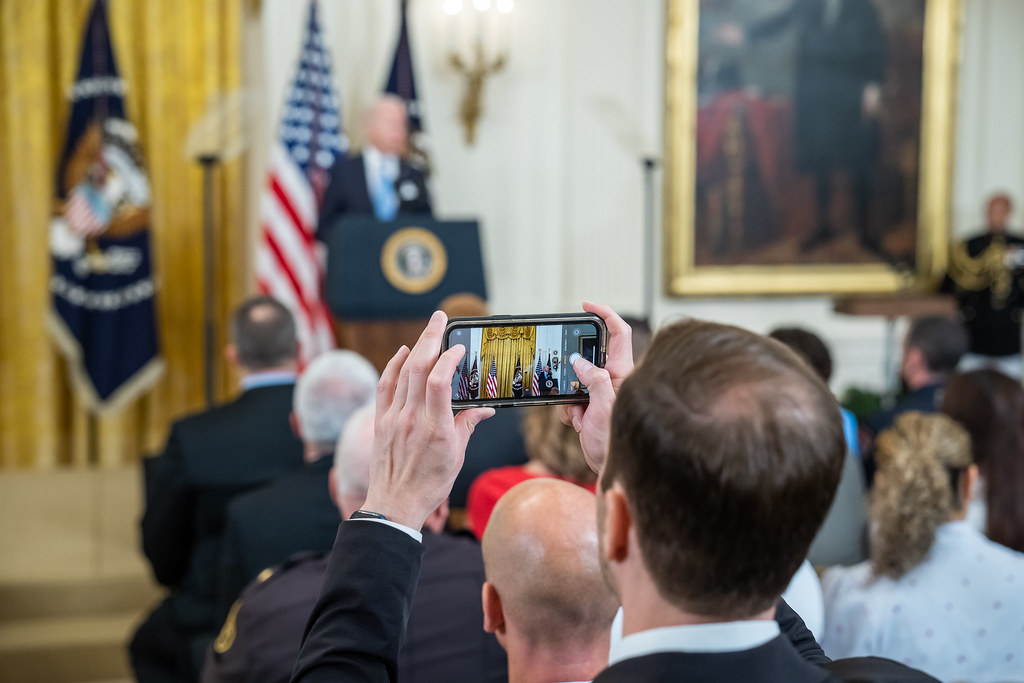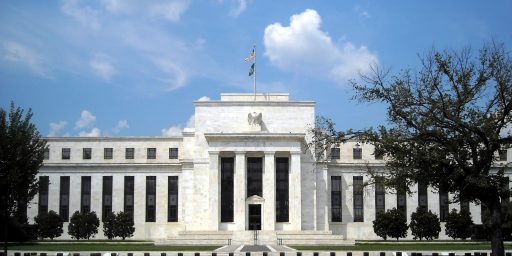The News is Bad for Biden
The nature of American political reporting distorts our perception of reality.

WaPo’s Perry Bacon Jr. explains how, in his view, “media coverage drove Biden’s political plunge.” The lede:
The mainstream media has played a huge, underappreciated role in President Biden’s declining support over the past year. Its flawed coverage model of politics and government is bad for more than just Biden — it results in a distorted national discourse that weakens our democracy. The media needs to find a different way to cover Washington.
I’ve seen this assertion made by quite a number of OTB commenters and it’s not at all implausible. Even a rudimentary exposure to media studies introduces the ideas of agenda setting and framing. While “the media” is much more diffuse than it was even twenty years ago, a handful of outlets tell us what’s important and how to think about it.
Alas, Bacon’s support is, well, thin:
One of the sharpest dips in Biden’s approval rating — which has dropped from 55 percent in January 2021 to less than 39 percent today — happened last August, when it declined almost five points in a single month. There wasn’t a huge surge in gas prices, nor some big legislative failure. What caused Biden’s dip was the U.S. withdrawal from Afghanistan — or, rather, the media’s 24/7, highly negative coverage of it.
To be clear, Biden deserved criticism. The early stages of the U.S. exit were tumultuous, with desperate Afghans clinging to U.S. military planes and massing outside the Kabul airport. The Taliban took control far more quickly than the administration anticipated. But for much of August, the homepages of major newspapers and cable news programs were dominated by Afghanistan coverage, as if the chaotic withdrawal was the only thing happening in the world. Journalists and outlets tore into the president, with Axios calling the withdrawal “Biden’s stain,” NBC News correspondent Richard Engel declaring that “history will judge this moment as a very dark period for the United States,” and CNN’s Jake Tapper asking an administration official on his show, “Does President Biden not bear the blame for this disastrous exit from Afghanistan?“
Our withdrawal from Afghanistan was an absolute shit-show. I can’t imagine that any President wouldn’t have been hammered for it. It was the culmination of a twenty-year effort and it ended not only disastrously but did so in a visually compelling way.
Further, the same institutions continued reporting on the story. For those paying attention—which, alas, is a tiny fraction of the mass public—it became clear that the extraction effort rather quickly recovered. To be sure, the Taliban takeover was swift and brutal. But I think most of us understand that, unless we were willing to stay another twenty years, that outcome was inevitable.
Biden’s poll numbers plunged, closely tracking the media hysteria. As The Post’s Dana Milbank wrote in December, data analysis showed a marked increase in negativity in media coverage of Biden that started last August. After the withdrawal, the media lumped other events into its “Biden is struggling” narrative: infighting among Democrats over the party’s agenda, Democrats’ weak performances in the New Jersey and Virginia gubernatorial races, rising inflation, and the surge of the delta and omicron variants. Biden’s role in these issues was often exaggerated — there are many causes of inflation besides Biden’s policies; presidents can’t stop the emergence of coronavirus variants. This anti-Biden coverage pattern remains in place.
Oh, for fuck’s sake, Perry. Presidents get outsized credit and blame for everything. It’s the way of the world. It ain’t new or specific to Biden.
Sure, some of it is sloppy and sensationalistic reporting. The very nature of daily news reporting is that we hyper-focus on the question What’s different today than yesterday? and draw overbroad conclusions and try to spot trends from blips.
But, hell, even seasoned historians do this. We break up our study of American history into presidential terms. It’s a natural, easy organizing construct.
Is it silly to hyper-analyze off-off-year elections and try to read the tea leaves? Of course it is. But it’s how political reporting has worked as long as I can remember. And I’m old. Moreover, I don’t know what else political reporters and opinion writers are going to do. People who care about politics follow it like a sport and want daily coverage. When there’s very little news, minor happenings get dissected and analyzed to death. That’s just how it is and it’s unreasonable to expect that to change.
Moreover, none of this is Biden-specific. There’s absolutely reason to criticize the press for “Democrats in disarray” stories that lack broader context. Or for sensationalizing gripes from a handful of backbenchers as though they were representative of the larger party.
But an embarrassing exit from America’s longest war? The highest inflation since leisure suits were in style? A spike in a deadly virus even after a massive vaccination campaign? Yeah . . . that’s gonna get covered.
Afghanistan was an important turning point in media coverage for two reasons. One, it provided journalists the big anti-Biden story that I think many of them were desperate to find. And it drove down Biden’s popularity with the public, giving the media justification for even more coverage that cast the president as struggling.
So, look. Bacon works at the Washington Post. He almost certainly spends a lot more time with important journalists than I do and therefore has better insights into their thinking.
But, again, I don’t see how the media was going to avoid covering Afghanistan and doing so in a negative way. Further, it happened five weeks into Biden’s presidency. Was there really that much pent-up demand to tear him down?
It’s certainly true that the episode hurt his popularity. But his popularity was artificially high: he was a brand new President who replaced the worst President in American history. He took office two weeks to the day from a massive riot in the United States Capitol seeking to overthrow the election results!
Further, even without the Democrats in disarray stories (which, honestly, I’m not sure all that many people are reading) Biden’s numbers were bound to collapse. Even leaving aside Afghanistan, which will be a non-factor in November, let alone in November 2024, big-time inflation, and the uptick in the pandemic, the fact that he’s largely failed to pass his domestic policy agenda was naturally going to cause significant infighting within the party.
Given our hyper-polarized climate, Biden had next to zero Republican support to begin with. Independents and Democrats were naturally going to fall off given how little of what he promised he’s accomplished. That ain’t “the media’s” fault.
Biden coverage shifted in this direction because of the media’s long-standing biases toward bothsidesism and strong criticism of those in power. (When I say “mainstream media,” I’m referring to the news coverage in national newspapers such as The Post and the New York Times, major broadcasters such as CNN, wire services like the Associated Press, local newspapers and TV stations, and publications with elite audiences such as Axios and Politico. These outlets do not coordinate their reports, but they take cues from each other and have similar coverage approaches.I’m not referring to opinion pieces in these outlets or the work of news organizations that have a clear ideological bent.)
Reporters tend to view their role as a check on politicians. This means presidents are always covered skeptically — but when one party dominates Washington, the political media often scrutinizes that party’s president even more. Presidents Bill Clinton, George W. Bush, Barack Obama and Donald Trump got very negative coverage at times when their parties also controlled Congress.
Yup. That’s how it works. Note, too, that Clinton, Bush, and Obama all got re-elected.
The nature of modern press coverage—which has become 24/7/365—is that there’s a beast that must continue to be fed. People are no longer content to read the morning paper, see what Walter Cronkite has to say before dinner, and then read Newsweek and watch “Meet the Press” on the weekend. Those who want it can get a constant stream of political reporting and analysis.
That means at least two things. First, there’s a whole lot of sheer crap that’s meaningless 24 hours later. Second, Presidents and other political leaders are scrutinized in a way they weren’t even 40 years ago. We watch the sausage being made despite admonitions to the contrary. No man is a hero to his valet. Insert more bromides here.
And, of course, the media doesn’t exist in a vacuum. Because coverage is 24/7/365, so is politics.
A drive-by commenter the other day was complaining that the meanies at OTB didn’t give poor Donald Trump a honeymoon period before starting to critique him. While there were very many unique-to-Trump reasons why that was true, it’s also the case that the last President to even arguably enjoy such a respite was George H.W. Bush in 1989—and probably Ronald Reagan in 1981.
The 24-hour news cycle, kicked off by CNN in 1980, took quite a long time to fill. At least by the time Bill Clinton took office in 1993, though, the political parties adapted to the new environment expanded their activities, beginning what I like to call the permanent campaign. We’ve been talking about who will replace Joe Biden since before Joe Biden was inaugurated.
All of which is to say that Bacon is partly right but that he’s not saying anything interesting. Biden has been a part of this news environment since its inception. It’s simply a reality he has to deal with.
Finally, deep into the piece, he gets to the point that so many OTB commenters make:
Also, the media’s “equally positive and negative to both sides” approach has been challenged by the increasingly radical and antidemocratic Republican Party. Honest coverage of political news often seems anti-GOP. The mainstream media covered Trump very harshly, particularly in the final months of his presidency as he worked to overturn election results. Some journalists, consciously or unconsciously, were poised to “balance” that negative Trump coverage with criticism of Biden, even if his actions weren’t nearly as deserving of condemnation. In the post-Trump era, leaders at CNN, the New York Times and other major outlets have emphasized that they don’t want to be perceived as more aligned with the Democrats.
So, I think that’s right. Up to a point.
There’s no way a reasonable person reading the major outlets Bacon refers to above would come away with the impression that Biden and Trump are equally bad Presidents or that Biden’s failures are even in the same ballpark as Trump’s. At the same time, I think a lot of Democrats want to press to constantly insert something like “Hey, things would be a lot worse if Trump were still in the White House so why don’t you give ol’ Joe a break?” into their reporting. That’s . . . just not how it works.
Honestly, a better version of this critique, one I’ve also seen made by a handful of OTB commenters, is that the press has simply baked in how awful the Republican Party leadership is and takes it as a given. That there’s not a single Senate Republican vote to be had on pretty much anything Biden wants to pass—no matter how popular it might be even with Republicans in their state—is so unremarkable that it’s literally not remarked upon. Which, naturally, shifts all of the agency to Joe Manchin, Kyrsten Sinema, and Joe Biden.
Again, though, I think that’s more of a function of the media’s bias toward the news as something that’s new than it is overcorrection in the face of charges of partisan bias.
In the first few months of 2021, many in the media focused on narratives that seemed like they could turn into big anti-Biden stories but didn’t pan out. Before most public schools were open, journalists focused on closures because Biden had pledged to get kids back in the classroom. Biden’s first news conference as president, in March 2021, featured numerous questions about a surge in migrants across the southern border and some about his 2024 plans, but not one on covid-19, which the administration seemed to be handling well.
In August, the hunt found its mark: the Afghanistan withdrawal. And as high inflation became entrenched, the media had a perpetual issue to ding the president on.
This seems to me simply retconning events to fit a narrative. Nobody was out to get Biden. They’re looking for interesting stories to tell.
Planes that don’t crash and buildings that aren’t on fire are far and away more representative of reality than the reverse. They ain’t news, though. Which means that news coverage often distorts our perception of reality.
Relentless negative coverage is toxic for politicians. As University of Minnesota policy analyst Will Stancil has argued, U.S. news coverage often has a collective tenor, what he calls a “main signal.” This signal seeps from traditional news sources into social media, with stories shared on platforms such as Facebook and Twitter.
Biden’s arc shows what happens if this broad tenor turns against a politician. There seems to be a generalized frustration with him, as opposed to unhappiness over a single issue or two, even among people who don’t closely follow traditional news outlets or are generally supportive of his views.
None of this is Biden-specific. Or even unique to the 24/7/365 news cycle. I’m old enough to remember Jimmy Carter and the “malaise” era.
I do think it’s gotten worse over time. Aside from all the things I’ve already mentioned, the “main signal” reference reminds me of our fascination with polling, which is a relatively cheap way to generate news when there isn’t any. There’s really not much reason to care how popular Biden is more than two years away from the next Presidential election but some outlet or another is asking and then generating stories around it on at least a weekly basis. Ditto whether the country is “moving in the right direction.”
Similarly, the constant reporting on high inflation—and, again, it’s systemic: these figures have been released monthly and dutifully reported for as long as I can remember—creates angst where it wouldn’t otherwise exist. I’ve certainly noticed prices going up but, aside from meat and gasoline, I don’t really pay all that much attention to what everyday items cost. I’m doing just fine but the news that prices are going up 8% or 9% a month while my pay remains static doesn’t exactly make me happy.
Finally, a million or so paragraphs into a column I would otherwise have long since stopped reading were I not blogging on it, Bacon gets to a real point:
Now, Biden is polling worse than Trump was in July 2020, when thousands of people were dying each week of covid, a situation much worse than the real and serious problem of high inflation in the Biden era. You can’t credibly argue that Trump, with his constant inflammatory statements and incompetent management, was a better president than Biden. These poll numbers reflect something gone wrong.
And in my view, media coverage is a big factor in those warped polling results. Media commitment to “equal” coverage of both parties has resulted in a year and a half of coverage since Biden entered office that implies both parties are similarly bad, as if the surge of inflation and some of Biden’s policy mistakes rival a Republican Party that is actively undermining democracy in numerous ways, such as continuing to voice baseless claims of voter fraud in the 2020 presidential election, passing measures making it harder to vote, and gerrymandering so aggressively in states such as Wisconsin that elections are effectively meaningless.
The thing is, public attitudes just don’t work the way Bacon wants them to.
It’s absolutely true that Biden is a better President than Trump was. And even more obvious that things are far, far better in July 2022 than they were in July 2020. But even the most rational of us don’t think that way. If I wake up with a hangover, I don’t console myself with, “Well, at least you’re not confined to a wheelchair. You should really be grateful!”
And, again, as a rather avid media consumer, there’s simply no truth to the notion that Biden’s presidency has been treated as though it were just as bad as Trump’s. COVID was, rightly, treated as an epic, ongoing national catastrophe and Trump was, rightly, blamed for his horrific leadership during that crisis.
Biden’s numbers aren’t worse than Trump’s because people think the country is worse off today than it was during the middle of the pandemic. They’re where they are because Biden’s doing less well with Democrats now than Trump was with Republicans then. Like it or not, Trump was more successful in pushing his policy agenda, such as it was, than Biden has been. Most notably, he had already put two Justices on the Supreme Court and would soon get a third—the results of which are decisions that have crushed the soul of the Democratic base, who now blame Biden for not doing more to stop them.
Ultimately Bacon wants the whole nature of political coverage to change:
Yes, I am calling for the media to cover Biden more positively. Not in the sense of declaring Biden a better man than Trump (though that is obviously true). Instead, political coverage should be grounded in highlighting the wide range of our problems and assessing whether politicians and parties are working toward credible solutions. Such a model would still produce a lot of stories about surging inflation, Afghanistan and other issues where Biden’s policies haven’t worked. But there would also be more stories about other issues important to Americans, even if they were going well under Biden (like the huge job growth during his tenure). Ideally, on every issue, the media would compare the Republican and Democratic solutions. You can see how this model might help Biden — but the bigger benefit would be to readers.
Essentially, he wants reporters to become political scientists and sociologists. Which might indeed produce more useful coverage. But I don’t know how many people would actually read it. Presumably, the folks who run newspapers and cable outlets have given some thought to what draws readers and viewers.
It’s too early to say whether Biden is a great or even good president. But most Americans aren’t getting a fair look at that question. Instead of telling us whether Biden is effective, the media has focused on showing that it is not too biased toward Democrats. Better that journalists actually cover America’s problems and whether Biden is solving them — or at least has better policies than the Republicans. That’s the kind of journalism we need.
So, I think that whether Biden’s policies are better than the Republican alternative is absolutely the right question to ask in campaign coverage. It’s much more valuable and important than the horserace reporting that we tend to get too much of.
It’s not the right question right now, though. Biden should absolutely be judged against his campaign promises and the general state of affairs. Yes, such things as inflation should be placed into their proper context—Americans should definitely understand that prices are going up everywhere, not just here. But Jimmy Carter successfully hung the “Misery Index” around Gerald Ford’s neck and Ronald Reagan did the same thing to Carter four years later.
Biden should be getting more credit than he’s getting for his handling of the Ukraine crisis. While I disagree with bits and pieces on the edges, it’s been masterful overall—simultaneously taking a stand for the liberal world order, strengthening the Western Alliance, and weakening an enemy power. Republicans should be getting more shame than they are for their appeasement of Putin. But Americans tend not to pay that much attention to foreign affairs.
Regardless, the time for contrasts will come. Presuming Biden runs for a second term, he’ll absolutely be compared, hard, to the Republican nominee. To some extent, of course, it’ll be about personalities and style, not just competing policy portfolios. Then again, as Biden has demonstrated, much of the agenda Presidents campaign on fails to become policy. What endures is personality and temperament.






Long story short – We shouldn’t criticize the press for being the way they are, that’s just the way they are.
So, when you say “… withdrawal from Afghanistan was an absolute shit-show.” Compared to what Saigon? Dunkirk? Iraq?
It is an absolute fact that the intel on how long it would take the Taliban to reassert control was laughably wrong and that set the tone for the withdrawal but under the circumstance I’m not sure it was any more or less chaotic then bug outs from the past. We only had 2,500 troops left in country. Biden was saddled with the choice of flooding the zone with a short term build up which could have easily gone sideways and made things much worse or doing what he did which frankly was pretty successful give the circumstances.
Can you imagine the same thing if Trump had been in office?
So you’re fine with tearing Biden down for a year or more and believe that everything will be fixed in the fullness of time by the same agents that have been tearing him down.
Say hello to your new Repubican torturers – the ones who have announced that they are fine with torturning women. Pro tip: They never stop with just one group of people.
@James: I read the Bacon piece last night and my basic reaction was that he really didn’t have the evidence to back his claims in the main.
However, I think he has a point that the press has a template that is problematic (and hence your note that this isn’t “Biden-specific”). Indeed, not, but I think as you touch on, the main problem here is bother-siderism and the fact that press, as Bacon notes, thinks of themselves as a check on power, and the easiest (sometimes laziest) way to do that is to simply criticize the party in power. And, to link this up to own on my ongoing themes: the press, as a whole (as is true of most of America) talks like the system is competitive and fair and so if one is failing at governing it is because you are in disarray or not communicating well. If you just had better strategies and negotiated harder, well, you would be successful! So, if things aren’t going well, you must be incompetent, if not in disarray.
I do think the mainstream press has hyped the negative with the Biden administration in the same way they e-mailed us to death with HRC. It is just a path of least resistance kind of thing.
What am I going to write about today? Think. Think. Think.
Oh, inflation ticked up another tenth of a point! I can do a pending malaise piece!
And off I go…
I also continue to firmly believe that most people, including those at elite media outlets, simply don’t really understand the challenges inherent in American political institutions, and so writing in this sort of horserace way makes sense to them. Who’s up? Who’s down? Who made a mistake? Who failed to get what they wanted? What awful thing in the world is eluding presidential magic today?
Plus: stories about how hard things are and how long they take to get done are boring.
@Steven L. Taylor: Upvoted for that last sentence, although I think it’s possible that they may be more interesting than the common journalistic wisdom believes. But that takes a bit more work.
@Steven L. Taylor:
I’d only add that this model worked really well for the media’s bottom line under Trump, so much so that it had a numbing effect over time as Trump fed them some weird statement or displayed some norm breaking behavior on a daily basis. If there isn’t new news every day, something has to be invented to drive traffic.
@Steven L. Taylor:
100% this. This is one byproduct of the nationalization of politics. It definitely distorts our understanding of the Federal government. What I wouldn’t give for national news outlets to *stop* doing national generic congressional polls.
That said, I also feel like this goes beyond the news and also ties into academic polling centers and private pollsters who also, unfortunately, have to feed the beast. So they create content that’s easy to package and post.
This is what happens when an ecosystem evolves to support a specific view of national politics.
Beyond that, I think it’s fair to say that Americans as a culture really struggle with the idea of structural conditions bounding certain forms of “rational thought” decision making and behavior. So that fits into this discussion as well.
@Steven L. Taylor:
Negative news is easier to write than positive news for many journalists. In part that’s because journalists often feel that writing negative news proves their “objectivity” or helps minimize bias.
“See? We’re as tough on Biden or Clinton as we were on Trump.”
More often than not these days, the news isn’t the news.
People want and form their opinions from 280 character scribes. News competes for this majority of Americans with short takes, glamorized headlines, flash and awe. How many times do you hear someone repeat a headline but give no details when you want more information? It’s mainly the headlines are bad. If you take the time to read through the deeper details you may find it’s not as bad as the headline implies, but news just needs to hook the fish before it sees another bait. The fish is busy binge watching 8 hours of netflix, it doesn’t have the time for two plus pages of thinking and further research.
We always want mercy for us and ours, justice for others.
It is not the press/media job to decide who to align with or give hall passes to. It is their job to bring forth the facts, cross checked and verified to the best of their ability, and let the consumer make their best judgement as to the facts presented. It might even include making those in power uncomfortable.
In the case of Joe Biden, he has repeatedly (in my opinion) over promised, under delivered, and poorly communicated the changing reasons for deviating from previous stated policies. Does anyone really know his position on fossil fuel production right now?
I think he has richly earned his low approval rating based on what has actually transpired, not on what was reported.
“Essentially, he wants reporters to become political scientists and sociologists. Which might indeed produce more useful coverage. But I don’t know how many people would actually read it. Presumably, the folks who run newspapers and cable outlets have given some thought to what draws readers and viewers.”
*The three sons of bitches were actually five:
Gabriele D’Annunzio, the man who invented Fascism;
Errol Flynn, who he described as a “despicable human being;” and,
Fulton Lewis Jr., George E. Sokolsky, and Westbrook Pegler, who were journalists who compromised their integrity by becoming cheerleaders for Senator Joseph McCarthy.
He outlived them all and was working on his final book To Hell with the Joys of Old Age! when he died in 1995 at the age of 104.
Source
Par the course for the But Her Emails crowd.
The media is never going to recover for its collective failure to atone for its catastrophically sexist anti-Hillary Emailghazigatepalooza national b**h hunt.
The anti-Biden bias is just another notch in an absymal record of late. Any cohort that won’t expunge hacks like Chuck Todd, Kathleen Parker, and Chris Cillizza is lost.
But the problem is still the American people. Plenty of news consumers don’t fall for the corporate media bs and instead find commentary that has either balance or moral clarity (Robert Hubbell, Jamelle Bouie, The Bulwark esp Cathy Young, Kareem Abdul-Jabbar, Jen Rubin, Adam Serwer, David French, Parker Malloy, Jen Rubin, among many others).
The casual news observer isn’t familiar with these folks, sadly.
The thing about Afghanistan is not just the negative coverage during the withdrawal which one would expect but the fact that the press coverage there has been abysmal the last 10 years. In fact, I dare suggest that the coverage was intentionally bad during the whole decade and the fact that the takeover by the Taliban was so swift was an indictment on them. Of course, they rather point fingers instead of reflecting on why they missed the real story so badly.